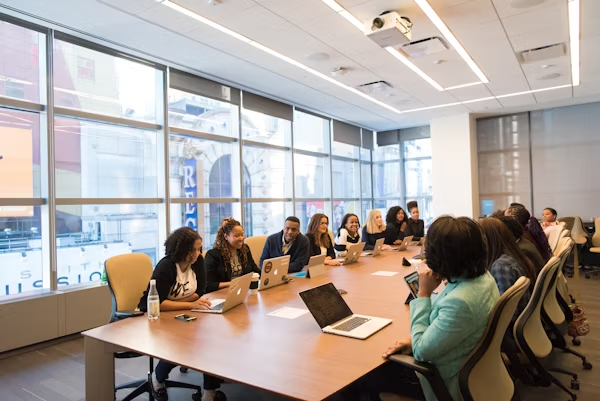Are you a recent graduate or someone looking to switch careers? The question of whether work experience counts as employment might be on your mind. You’re not alone!
Likely, you have also heard a lot of positive or even terrifying stories about work experience positions. Some people do not consider work experience as an employment. Rather, they see it as a means of assisting people in obtaining jobs and pursuing their ideal occupations.
Depending on the nature of the work being done, some persons still view work experience as a type of employment. This raises the question of whether or not work experience counts as employment.
In this article, we’ll break it down in the simplest terms to help you understand how work experience relates to employment. Keep reading.
Table of Contents
- Does Work Experience Count as Employment?
- What is a Work Experience?
- Can I include unpaid internships in my work experience?
- Is Work Experience a Good Idea?
- How can I gain work experience if I have none?
- How does work experience benefit your career?
- What if my work experience is unrelated to my desired job?
- Does Work Experience Count as Employment for Students?
- Does Volunteering Count as Work Experience
- Does an Unpaid Internship Count as Employment in Background Check
- Is an Internship Considered Equivalent to a Job? – Quora
- Frequently Asked Questions
- Conclusion
- References
- Recommendations
Does Work Experience Count as Employment?
Yes, work experience counts as employment, but it’s important to distinguish between the two. Employment generally refers to formal, paid positions where you work for an organization, and in return, you receive compensation.
On the other hand, work experience encompasses a broader range of activities and includes both paid and unpaid roles. It refers to the functional skills an qualification you acquire through various means, such as jobs, internships, volunteering, or personal projects.
While work experience is related to employment, it extends beyond it to include all experiences contributing to your professional development.
You should read: 10 Best Architectural and Engineering Managers Colleges in 2024
What is a Work Experience?
Most certainly, you have heard your teachers discuss work experience to you during class. In Year 10 and occasionally in Year 12, students are required to complete a work experience program. But different schools may have different policies on this.
Students typically conduct career research and get in touch with potential employers. After that, they are free to request to complete their work experience placement there.
Typically, the majority of colleges mandate that students complete a minimum of one week of work experience. You are, nevertheless, free to take as much time as you choose.
Your instructors in college and sixth form will most likely advise you to gain even more work experience. Depending on your course, you can be eligible for a work experience placement while attending university. Alternatively, you could continue to obtain your own professional experience apart from your education.
But employment experience isn’t limited to voluntary jobs. Your previous part-time job may count as your work experience.
Can I include unpaid internships in my work experience?
Absolutely! Unpaid internships hold significant value as part of your work experience. They offer opportunities to gain practical skills, exposure to a professional environment, and a chance to build your network.
When showcasing your work experience on your resume or discussing it in interviews, unpaid internships should certainly be included. Focus on the skills and knowledge you gained during these experiences, as they can be just as relevant as paid work when applying for jobs.
Check out this related content: What To Do When Student Loan Account Is Closed Due To Transfer
Is Work Experience a Good Idea?
Yes it is, even though work experience is categorized as a type of job. But since it’s a contract job, some companies might not agree.
This may give the impression that job experience is meaningless, which could discourage people from participating in it. You must realize, nevertheless, that it makes no difference to what your ideal company considers work experience. Even with work experience, you can still become more employable!
Work experience still gives you a better understanding of the field you are interested in, even though it might not appear beneficial in the employment section of your resume. You can use this to determine whether or not the role is a good fit for you.
Thus, completing work experience can genuinely assist you with your future career choices, even if you or a potential employer do not view it as employment.
Also, work experience placements can assist you in developing a variety of talents, including transferrable abilities like communication that enhance the appearance of any job application. Additionally, you might obtain some favorable recommendations, which would boost your chances of landing a position with prospective companies!
How can I gain work experience if I have none?
Identify Your Interests
Begin by pinpointing your career interests and the specific skills you want to develop. This will help you target relevant work experiences.
Volunteer Opportunities
Look for volunteer positions related to your interests. Nonprofits, community organizations, and even local businesses often welcome volunteers.
Internships
Apply for internships, whether paid or unpaid, in your field of interest. Internships are valuable for hands-on experience and building a professional network.
Part-Time Jobs
Consider part-time jobs in industries related to your desired career. Even entry-level positions can provide relevant skills.
Freelance or Gig Work
Offer your services on platforms like Upwork or Fiverr to gain experience and build a portfolio.
Personal Projects
Initiate personal projects or side ventures that align with your career goals. These can demonstrate your passion and initiative.
Networking
Attend industry events, seminars, and workshops to network with professionals. Personal connections can lead to opportunities.
Online Courses
Enroll in online courses or certifications to acquire specific skills. Include these on your resume as part of your work experience.
Build a Portfolio
Create a portfolio showcasing your work, even if it’s from personal projects or volunteer experiences. This can impress potential employers.
Apply Widely
Apply for entry-level positions or internships in your desired field. Tailor your resume and cover letter to emphasize your transferable skills and passion for the industry.
Also check out this content: How to Submit the FAFSA To More Than 10 Colleges
How does work experience benefit your career?
Work experience offers several significant benefits to your career:
- Skill Development: It allows you to develop practical skills and gain hands-on experience in your field of interest.
- Networking: Work experiences provide opportunities to build a professional network, which can open doors to future job opportunities.
- Resume Enhancement: Listing relevant work experience on your resume makes you a more attractive candidate to potential employers.
- Problem-Solving: Real-world experience hones your problem-solving abilities and adaptability.
- Confidence Building: Successfully navigating work experiences boosts your confidence and prepares you for future challenges.
- Industry Knowledge: It helps you gain a deep understanding of your chosen industry, its trends, and its challenges.
- Career Clarity: Work experience can confirm your career choice or help you decide if a different path is a better fit.
Having work experience that seems unrelated to your desired job can still be valuable. Here’s how to leverage it:
- Transferable Skills: Identify skills from your previous experiences that are transferable to your desired job. These might include communication, teamwork, problem-solving, or time management.
- Relevance Emphasis: On your resume and in interviews, emphasize the aspects of your work experience that align with the job you’re applying for. Highlight how your skills can benefit the new role.
- Bridge the Gap: If possible, consider taking additional courses, certifications, or gaining relevant experience through volunteering or part-time work to bridge the gap between your experience and your desired job.
- Networking: Leverage your professional network. Someone you know may be willing to give you a chance based on your character, work ethic, and potential, even if your experience appears unrelated.
- Passion and Adaptability: Express your passion for the new field and your willingness to adapt and learn quickly. Hiring managers appreciate candidates who show enthusiasm and a strong work ethic.
While unrelated work experience may not align perfectly with your desired job, it can still contribute to your qualifications and demonstrate your versatility to potential employers. Focus on the skills you’ve gained and your ability to adapt and grow in a new role.
Also check out this content: 10 Smart Questions to Ask on a College Tour | Act Smart
Does Work Experience Count as Employment for Students?
Work experience is categorized as a type of job. And so, for a student, it counted as a temporal placement. But since it’s a contract job, some companies might not agree that work experience is employment.
Does Volunteering Count as Work Experience
Your career can benefit from volunteer work just as much as it does from paid employment. Including volunteer experience on your resume can show prospective employers that you have a strong sense of community, have worked with people from different backgrounds, and have transferable talents.
Does an Unpaid Internship Count as Employment in Background Check
Unpaid work may not be regarded as a standard hire right background check. But that’s precisely the kind of information you should emphasize in your CV or application. Anything you accomplished during your employment should be highlighted there.
Is an Internship Considered Equivalent to a Job? – Quora
While an internship isn’t regarded as a legitimate job, it is comparable to a temporary position in a business setting and counts as work experience.
Also Read This: What If My Family Can’t Meet Our EFC? Best Alternative
Frequently Asked Questions
Yes, work experience does count as employment, but it’s important to understand the distinction between the two. Employment typically refers to being formally hired by an organization and receiving compensation for your work.
Absolutely! Unpaid internships can be a valuable part of your work experience. They provide you with practical skills, exposure to a professional environment, and an opportunity to network. When listing work experience on your resume or discussing it in an interview, unpaid internships should be included.
Work experience significantly enhances your employability. Employers often value candidates with relevant work experience because it demonstrates your ability to apply your skills in a real-world setting.
The importance of work experience versus a degree depends on the job and industry. In some fields, a degree is essential and serves as a foundation for employment. However, in many cases, especially for entry-level positions, work experience can carry significant weight.
If you’re starting with little to no work experience, there are several ways to gain it. You can start with internships, volunteer work, part-time jobs, freelance projects, or even personal projects related to your desired career field.
Conclusion
Work experience is like a secret weapon. It may not be the same as formal employment, but it holds immense value in shaping your career.
Remember, whether it’s through internships, volunteering, or personal projects, your work experience can be the key to unlocking exciting opportunities and making you stand out in the job market. So, go out there and start building that valuable experience today!
References
- work.chron.com– Does an Internship Count as Employment?
- resumeworded.com– Does Your Experience Counts As Work Experience (+ Examples)
Recommendations
- 10 Best Architectural and Engineering Managers Colleges in 2024
- What To Do When Student Loan Account Is Closed Due To Transfer
- How to Submit the FAFSA To More Than 10 Colleges
- 10 Smart Questions to Ask on a College Tour | Act Smart
- What If My Family Can’t Meet Our EFC? Best Alternative
- 10 Best Naval Architecture Schools in 2024 | Admission, Cost






